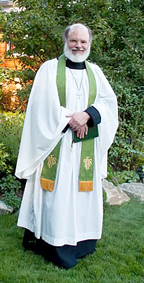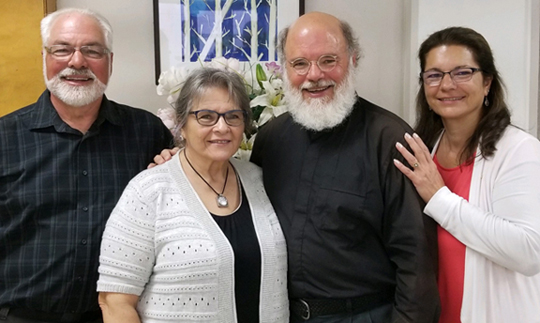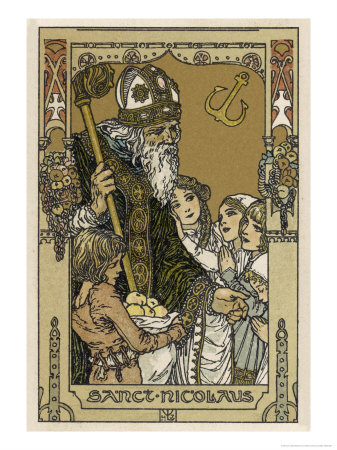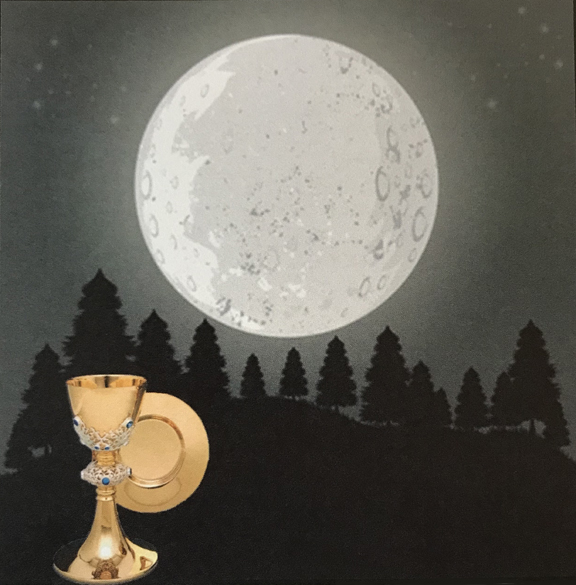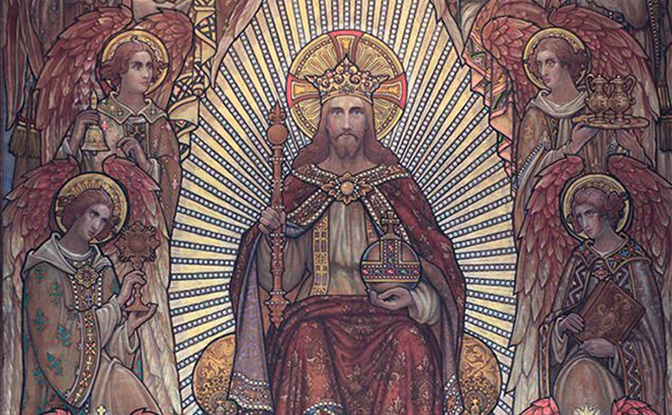November 2019
|
I'm Never Coming Again!
That was some
time ago, and I’ve never seen her since.
In the seminary I learned the opposite. I learned
from reading the famous scholars, Gerhard von Rad
(1901–1971) and Claus Westermann (1909–2000), that grace
also comes through the covenant with Moses, and not just
from Jesus. But when I read Martin Luther’s ten pages on
this verse (Luther’s
Works 22:139–48), I followed him instead. I asked my
teachers to critique Luther’s analysis, so I could see
further why they preferred their ideas to his, but they
didn’t. The impression left was that Luther wasn’t worth
the time.
Luther is emphatic that we can render God “no
other satisfaction than that procured by the death of
Jesus Christ. He alone has brought us grace and truth….
Moses’ office is useful, and his message is blessed, but
only inasmuch as it teaches me what I must do and
directs me to another man, namely, to Christ” (LW
22:147). As long as that view goes unrefuted by Holy
Scriptures and our confessional heritage, I can see no
way to side with von Rad and Westermann over against
Luther.
From this I’ve learned that Luther goes begging
in the Lutheran church in America – especially among the
elites. So if you want to learn from him, you’ll have to
do it yourself. Secondly, I learned that people coming
to church are by and large uneducable. They don’t want
didactic sermons. They’re not interested in scrutinizing
the historical norms. They have made up their minds and
can’t imagine any better way. So if a pastor follows
Luther’s instruction that pastors should primarily be
teachers (LW
36:113), then expect few conversations and little or no
encouragement.
|
|
STEWARDSHIP
The Importance of Giving
Giving― I think we would all agree that this word represents one
of the pillars of our Christian faith.
Yet are we acting upon it?
There are many ways to give to our local community.
This seems all the more relevant to me as I notice a
growing and thriving city where the great wealth and prosperity
is contrasted with poverty and homelessness like we have never
seen before.
Looking the other direction and ignoring this problem is easy.
However, as a church community, we can all contribute to
improving our community.
No, we cannot solve this problem with a wave of the wand,
but each one of us can chip in to help those in need.
Whether that be by donating funds to the food bank,
volunteering at a shelter, or using your talents to lift others
up. Doctors and
nurses can help by volunteering to care for those in need of
medical care, lawyers can help by counseling those in need of
legal help, and contractors can help by building homes.
The list could go on and on.
Giving can be done in many ways.
Whatever way you choose will help to lift up God’s
community. God
Bless us all in our efforts to help the poor.
Tim Allen, Church Council |
|
PRESIDENT'S REPORT...by
Cary Natiello
It’s time for
a third quarter recap of our financial performance to date.
Year-to-date, through September 2019, we have continued to
sustain our solid financial giving to the church.
Here are the numbers: Total
ENVELOPE GIVING was ~ $184,000 against a budget target of ~
$170,000. Total GENERAL
OPERATING EXPENSES were ~ $75,500 against a budget target of
$73,600.
We continue to have one of our strongest budget performance in
years. At the end
of the third quarter, total envelope giving was $14,000 better
than budget and overall expenses were $1,900 over budget.
Further, our Pledge Report shows the dedication our congregation
has to our church.
At the third quarter, 20 members (almost 60% of those members
who pledged) exceeded their pledge by almost $23,000 or 25%.
My sincere gratitude to, and admiration of, our
congregation for their ongoing relentless financial support of
our church. Thanks
be to God!
Please remember as well to attend the
Saint Nicholas Fair on
December 15th following the 10:30 service.
We usually raise close to $10,000 each year for the West
Seattle Food Bank and West Seattle Helpline.
I know how much our congregation supports these two
critical resources for our community through generous giving of
their money and time.
I volunteer regularly at the
West Seattle Helpline
(WSHL) and can attest to how well it is run and how needed
the service is for many of our West Seattle neighbors.
The mission of the WSHL is to help
stop homelessness before it starts by providing financial
assistance in the form of rent and utility payments, clothing,
bus tickets, and referrals to help our neighbors in West Seattle
regain stability after facing hardship.
The WSHL financial
support is limited to just West Seattle zip codes (98106, 98116,
98126, 98136, and 98146).
So far in 2019, among other things, the WSHL has provided about
$158,000
in emergency rent, utility, and move-in assistance to help local
families stay safely in their homes and keep the heat, light,
and water running.
|
|
November Book
With the Mind:
Readings in Contemporary Theology
12-2 pm in the Church Lounge, Sunday, November 17th
The book for
November is Breakfast at
Sally’s: One Homeless Man’s Inspirational Journey (2009), by
Richard LeMieux. This book is about a small business owner who
goes bankrupt and becomes homeless. He writes his memoirs of
homelessness so others may have more sympathy for them and work
to find ways to end homelessness. Before LeMieux was homeless,
he thought, “Why don’t they just get a job? Why do they waste
their lives on booze or cocaine? Are they just lazy people who
don’t want to work?” (p. 17). Included in his story is a church
in Bremerton who helped him out and helped renew his faith (p.
425).
A copy of this timely and informative story is in the library.
If you would like to purchase one for yourself, contact Pastor
Marshall. Feel free to attend our meeting when we discuss how
the church can help with homelessness.
ANNOUNCEMENTS:
All
Saints’ Memorial Liturgy,
Friday, November 1st, at the Chapel of the Resurrection,
columbarium, 11:45 am, and Holy Eucharist in the chapel.
Plan to attend.
THANKSGIVING EVE:
Thanksgiving
will be observed with Holy Eucharist on Wednesday, November 27th
at 7 pm, in the chapel.
FOOD BANK COLLECTION
suggested donation for November is holiday foods: canned yams,
turkey, gravy, cranberries, stuffing and pumpkin.
FLOWER CHART:
There are still a few spaces left for Christmas flowers.
COMPASS HOUSING ALLIANCE:
Until Friday, December 13th, we will be collecting
Christmas gift items for the Compass Center for both men and
women. Some
suggested items to collect are: fast food, coffee shop, Target,
and grocery store gift cards in $5 to $25 increments;
new sweatshirts in
large sizes with the tags on, underwear, flip-flops, hats and
gloves in neutral colors and
new toiletries in
small sizes. Also, cash donations are welcome.
Please leave your donations at the office.
|
|
Saint Nicholas Faire
Sunday, December 15th, from 1 pm to 4 pm
Please plan to join us directly after church for this fun event.
We will have Silent & Live Auction items to bid on – Christmas
Items, Pet Items, and wide variety of restaurant gift cards,
just to highlight a few items.
We also have gift cards to local merchants for purchase,
always a good idea for that person on your list who has
everything. Plus
wine tasting with Maryhill Winery for an additional donation.
Admission is $5 per person or $15 per family if each attendee
brings a can of food, and $10 per person and $25 per family if
you do not contribute a can of food for each person.
Again this
year when you pay your admission, you will be given a BID NUMBER
to use on the Silent and Live Auction items.
This should help to protect the privacy and security of
all bidders.
It takes a lot of people to make the Saint Nicholas Faire a
success. Your
willingness to help and support this is very much appreciated,
if you missed the luncheon and didn’t get a chance to sign up,
please contact us (Valerie 206-227-6290 & Scott 206-354-1871)
and we can let you know what areas we still need help with.
Remember,
this is a fund raiser for the
West Seattle Food Bank
and the West Seattle
Helpline. All
the proceeds and cash donations are given directly to these two
deserving extended ministries.
But it will not be a success unless
you come, bid on
items, and have a good time!
We
look forward to seeing you ―
SUNDAY, DECEMBER 15, 2019, FROM 1PM to 4 PM!
-Scott & Valerie Schorn |
|
Holy
Communion on the Moon
___________________________________________________________________________________
The 50th Anniversary
by Pastor Marshall
Fifty years
ago, Neil Armstrong (1930–2012) and Buzz Aldrin (1930–
) walked on the moon – the first to do so, back in July,
1969. The next year the award-winning author, Norman Mailer
(1923–2007) wrote a book about it,
Of a Fire on the Moon.
In it he argued that when this happened, our brains became a
small “transistorized fist, and the chambers of the heart…
shrunk to the dry hard seeds of some hybrid future” (pp.
130–31). But not for me! And that’s because before Aldrin got
out of the Eagle to join Armstrong on the moon, he celebrated
Holy Communion in the Eagle. Before receiving the bread and the
wine, he recited from John 15 – “I am the vine you are the
branches…. Without me you can do nothing.” He did this to help
us look beyond the technical achievement of landing on the moon,
to “a deeper meaning behind it all” (First
Man on the Moon, 1970, p. 300). According to another
astronaut, that deeper meaning was that we are “no longer
shackled to the Earth” (Eugene Cernan and Don Davis,
The Last Man on the Moon,
1999, p. 344). That sounds like Colossians 3:2 – “Set your minds
on things that are above, not on things that are on earth.”
Thanks be to God! |
|
“King of
Kings” The Small
Group gathered at the home of Janine and Peter Douglass to watch
King of Kings, a 1961 movie (171 minutes) directed by
Nicholas Ray. In previous years we read and discussed such
things as parts of Luther’s Large Catechism in the
Book of Concord. This year we are watching and discussing
Jesus movies.
We watched about two-thirds of the movie Saturday evening, Sept.
21st, and the rest of it two weeks later on Oct. 5th. We then
discussed the movie comparing it to the gospel accounts of
Christ Jesus.
In general, it seemed to us that the movie portrayed Jesus as a
teacher of peace who nevertheless was disposed of by the Roman
authorities who wanted peace, but on their terms. We thought two
major flaws stood out among the many details we thought were
also amiss.
First, the significance of the resurrection was so abbreviated
that you would miss it altogether if you didn’t already know
about it. The only resurrection scene showing Jesus was a brief
encounter between Jesus and Mary Magdalene near the empty tomb.
This illustrates that the movie blunted and played down the
message of Jesus as the Lamb of God who stills the wrath of God
by His sacrificial death precipitated by the Jewish authorities
who were offended and threatened by his teachings and his deeds.
This brings up the second major flaw: the conflict between Jesus
and the scribes, Pharisees and Jewish authorities that pervades
the gospel accounts is almost missing in this movie. In the end,
Jesus is not tried by the Jewish priests and Chief Priest who
bring Him to Pontius Pilate demanding His death. In this movie
Jesus is tried solely by the Roman authorities as one who is
potentially an instigator of opposition to Roman Rule. The
overarching conflict in this movie is not between Jesus and the
Jewish authorities but rather between the oppressive Roman
conquerors and their Jewish subjects who get slaughtered (in
this movie) time and time again.
A
DVD copy of Kings of Kings is available in the Church
Library for those interested. We would like to know what you
think of it! Watch Barabbas and Judas work together. See the
centurion in charge of the slaughter of the innocents in
Bethlehem come to be the centurion who confesses Jesus to be the
Son of God at the crucifixion. Hollywood leaves out and adds
much to the Bible.
By the time you read this article, we will have watched and
discussed The Gospel According to St. Matthew, a 137
minute movie from 1964 directed by Pier Paolo Pasolini, a
controversial person who was gruesomely murdered at age 53.
We’re thinking the next one after it will be Jesus which
came out in 1999 as a 240 minute TV mini-series. It has been
reduced on DVD to 176 minutes. YOU are welcome to join us
whenever you are available. Not everyone is always available to
make it to all sessions. We have several more Jesus movies we
hope to view and discuss (see the whole list in the October
Messenger’s announcements)!
Janine and Peter Douglass, Valerie and Scott Schorn,
Holly and Louis Petersen, Mariann Petersen, Connie and Bob Baker |
|
Jeremiah 9.23
Monthly Home Bible Study, November 2019, Number 321
The Reverend Ronald F. Marshall
Along with our other regular study of Scripture, let us join as
a congregation in this home study. We will
study alone then talk
informally about the assigned verses together as we have
opportunity. In this way we can "gather
together around the
Word" even though physically we will not be getting together
(Acts 13.44). (This study uses the RSV translation.)
We need to support each other in this difficult project. In 1851
Kierkegaard wrote that the Bible is "an extremely dangerous
book.... [because] it is an imperious book... – it takes the
whole man and may suddenly and radically change... life on a
prodigious scale" (For
Self-Examination). And in 1967 Thomas Merton wrote that "we
all instinctively know that it is dangerous to become involved
in the Bible" (Opening
the Bible). Indeed this word "kills" us (Hosea 6.5) because
we are "a rebellious people" (Isaiah 30.9)! As Lutherans,
however, we are still to "abide in the womb of the Word" (Luther's
Works 17.93) by constantly "ruminating on the Word" (LW
30.219) so that we may "become like the Word" (LW
29.155) by thinking "in the way Scripture does" (LW
25.261). Before you study then, pray: "Blessed Lord, who caused
all Holy Scriptures to be written for our learning: Grant us so
to hear them, read, mark, learn and inwardly digest them, that
we may embrace and ever hold fast the blessed hope of
everlasting life, which you have given us in Our Savior Jesus
Christ. Amen" (quoted in R. F. Marshall,
Making A New World: How
Lutherans Read the Bible, 2003, p. 12). And don’t give up,
for as Luther said, we “have in Scripture enough to study for
all eternity” (LW
75:422)!
Week I.
Read Jeremiah 9.23 noting
the line let not the wise
man glory in his wisdom. Why not? On this read Jeremiah 9.24
noting the line
understands and knows me. Why does God matter more than our
wisdom does? On this read 1 Corinthians 2.6–7 noting the words
age,
pass,
hidden,
decreed and
glorification. Why
does eternal wisdom matter more than the temporal wisdom of the
age? On this read 2 Corinthians 4.17–18 noting the phrase
eternal weight of glory.
Why is a weighty glory more valuable? On this read Hebrews 2.15
noting the line through
fear of death were subject to lifelong bondage. Because
weight waylays this fear it is more valuable. How does it do
this? On this read Ephesians 1.7 noting the words
redemption,
blood and
riches. What makes
this death rich and all who believe in it at peace? On this read
Ephesians 5.2 noting the line
a fragrant offering and
sacrifice to God. Why does God need this? On this read
Romans 5.9 and John 3.36 noting the words
wrath and
God. And read
Colossians 1.20 to see how
peace comes when
God’s wrath is overcome. How so? On this
read John 10.28 noting the words
perish and
snatch. How valuable
is this assurance? On this read Luke 16.23–28 noting the two
uses of the word torment.
Does that settle it? What do you think?
Week II.
Read again Jeremiah 9.23
noting this time the line
let not the mighty man glory in his might. Why not? On this
read Deuteronomy 8.17 noting the words
beware,
might and
wealth. Why is it so
risky to have such confidence in our own might? On this read
Acts 17.28 noting the line
live and move and have
our being. What is the extent of this dependence on God? On
this read Psalm 104.29 noting the words
take and
die. That’s quite
severe. So if confidence is the wrong way to go, what’s the
right way? On this read Ephesians 5.20 noting the words
always and
thanks. Read also
Luke 17.16 noting the word
thanks there too. Why
is thanksgiving so far superior? On this read Psalm 100.4–5
noting the connection between the words
thanksgiving and
endures. How about
that?
Week III.
Reread Jeremiah 9.23
noting the other line let
not the rich man glory in his riches. Why not? On this read
1 Timothy 6.9–10 noting the words
destruction,
love and
pangs. So to spare us
this pain we shouldn’t glory in our riches and love them. What’s
a better way to go? On this read Luke 10.35 noting the word
spend. What makes
this a good use of your money? Note the word
compassion in Luke
10.33. Read also Mark 7.11–13 noting stealing money set aside to
help your father and
mother. Why is this
important? On this read Ephesians 6.1–3 noting the words
honor and
commandment. So
compassion for the needy and obedience to the commands of God
are a better way to treat your money than love it. Why is that?
On this read Mark 10.18 noting the words
God and
good. That means we
should look to God for right guidance and not what feels good to
us. Do you agree? Why or why not?
Week IV. Read Jeremiah 9.23 one last time noting the multiple uses of the word not. Why does God stand against us like that – opposing our wisdom, might and riches? On this read 1 John 2.15–16 noting the words lust and pride. Why is the world that way? On this read John 3.19 noting the line loved the darkness. What’s the consequence of these verses? On this read Jeremiah 17.9 noting the line the heart… is desperately corrupt. Jeremiah 17.5 therefore says that we are not to be trusted. And so God opposes our wisdom, might and riches. Where does that leave us? On this read Romans 7.24 noting the words wretched and deliver. How does God rescue us? On this read Colossians 1.13 noting the word transferred. This we can’t do because of our corruption. But God can and does do it. Why is that? On this read Ephesians 2.4 noting the phrase rich in mercy. What shall we say to this? Read Psalm 52.8 noting the words trust, God and forever. Not bad. Right? |
|
ALL SAINTS
Parish Festival Celebration
On
Sunday, November
3rd,
we will gather together to give thanks for our community
of faithful, baptized servants of God.
On this rich
day of the church year we gather to remember our calling as
God's saints, rededicating our lives to God's service and
rejoicing in the ministry of Christ.
This day we also join the Church Catholic in affirming
our belief in "the communion of saints" remembering all those
faithful who have died in Christ.
8:00 am Holy Eucharist – chapel
10:30 am
Festival Eucharist – nave
with Festival Procession.
CHRIST THE KING
The season of Pentecost and
the
Church Year will end with the celebration of the
Kingship
of Christ at the Sunday morning liturgies,
November 24th.
On this day we strengthen the belief that Christ is above
all and that every authority is under Him (Eph. 1.21).
We rejoice that the
One
who is, who was and is to come (Rev. 1:8) is the King and Lord
of all!
|
|
Remember in prayer before God those whom He has made your
brothers and sisters through baptism.
Louis & Holly Petersen, The Tuomi Family, Bob Baker, Sam & Nancy
Lawson, Pete Morrison, Eileen & Dave Nestoss, Bob & Barbara
Schorn, Aasha Sagmoen & Ajani Hammond, Connor Sagmoen, Kyra
Stromberg, Tabitha Anderson, Diana Walker, The Rev. Howard
Fosser, The Rev. Kristie Daniels, The Rev. Kari Reiten, The Rev.
Dave Monson, Sheila Feichtner, Antonio Ortez, Richard Uhler,
Yuriko Nishimura, Leslie & Mark Hicks, Eric Baxter, Deanne
Heflin, David Douglass, Owen & Noreen Marten, Jim & Bonnie
Henningson, Mary Ford, Nancy Wilson, Nell & Paul Sponheim, Mary
Lou & Paul Jensen, Rubina & Marcos Carmona, Rosita Moe, Mary
Blom, Claudio Johnson S, Bjorg Hestevold, Tatiana Ceaicovschi,
Jim Thoren, Trevor Schmitt, Cathy Conord and Karen Mulcahy.
Also, pray for Syria, unbelievers, the addicted, abused
and harassed.
Pray for the shut-ins that the light of Christ may give them
joy: Bob & Mona
Ayer, Bob & Barbara
Schorn, Joan Olson, Doris Prescott, C. J. Christian, Dorothy
Ryder, Lillian Schneider, Crystal Tudor, Nora Vanhala, Anelma
Meeks, Martin Nygaard, Gregg and Jeannine Lingle.
Pray for the newly married that they will fulfill their holy
vows and grow in holy love until their life's end:
Pray for Cary Natiello and Nelly Bartlett who were
married in the chapel by Pastor Marshall on Saturday, October
12, 2019.
Pray for our bishops Elizabeth Eaton and Shelly Bryan Wee, our
pastor Ronald Marshall, our choirmaster Dean Hard and our cantor
Andrew King, that they may be strengthened in faith, love and
the holy office to which they have been called.
Pray that God would give us hearts which find joy in service and
in celebration of Stewardship.
Pray that God would work within you to become a good
steward of your time, your talents and finances.
Pray to strengthen the Stewardship of our congregation in
these same ways.
Pray for the hungry, ignored, abused, and homeless this
November. Pray for
the mercy of God for these people, and for all in Christ's
church to see and help those who are in distress.
Pray for our sister congregation:
El Camino de Emmaus in the Skagit Valley that God may
bless and strengthen their ministry.
Also, pray for our parish and it's ministry.
Pray that God will bless you through the lives of the saints:
Saint Andrew, the Apostle. |
|
A Treasury of Prayers Heavenly
Father, calm the turbulence of my desires; quiet the demands of
my dreams; repress the waywardness of my will. Dwell in my heart
that I may readily and joyfully give up what you ask of me. May
I seek first your kingdom – knowing that afterwards you will
provide all that I need. In the name of Jesus I pray. Amen.
[For All the
Saints III:352, altered] |
